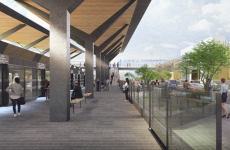Top Stories
Irish Billionaires Critique Metrolink Amid Transport Expert Support

UPDATE: Renowned billionaires are raising significant concerns about Dublin’s planned Metrolink, with investor Dermot Desmond labeling it a potential “monument to history.” In stark contrast, transport expert Brian Caulfield from Trinity College Dublin declares the Metrolink remains “the only show in town” for efficient public transport.
This debate escalates as Desmond and Ryanair CEO Michael O’Leary voice skepticism about the necessity of the €12 billion project, suggesting advances in autonomous vehicle technology could render it obsolete. Desmond argues that within the next 15 to 25 years, self-driving cars will dominate, leading to a drastic reduction in the need for public transport.
Professor Caulfield counters these claims, emphasizing that the Metrolink, projected to carry up to 20,000 passengers per hour and connect Swords to Dublin city centre in approximately 25 minutes, is essential for managing Dublin’s growing population and transportation needs. “Physically, lining up enough cars to transport that many people just won’t work,” Caulfield says.
“There isn’t a city on the planet right now that is doing what Dermot Desmond suggests with autonomous vehicles,” Caulfield stated, highlighting the inefficiencies of relying solely on cars.
As the Metrolink moves toward a potential construction start in 2028, the project aims to alleviate congestion in Dublin, which is projected to serve around 53 million passengers per year. Critics, including Desmond, argue that autonomous vehicles could achieve a 60% reduction in private vehicles on the roads.
Dublin Councillor Feljin Jose supports Caulfield’s position, stressing that autonomous vehicles are still cars, and the existing space limitations will persist. “We need to tread carefully in adopting this technology and not abandon our public transport systems,” Jose warns.
While autonomous vehicles have rolled out in cities like San Francisco and Phoenix, experts caution against seeing them as a one-size-fits-all solution. “They may work in rural areas but are complicated in urban environments with pedestrians and cyclists,” Jose added.
Caulfield emphasizes the importance of public transport systems like the Metrolink, stating, “We need to think about the future of transportation realistically. Relying solely on autonomous vehicles will not solve our mass transit issues.” As this debate unfolds, the future of Dublin’s transport infrastructure hangs in the balance.
Stay tuned for more updates on this developing story as stakeholders grapple with the implications of these contrasting visions for Dublin’s transportation future.
-

 Top Stories3 months ago
Top Stories3 months agoTributes Surge for 9-Year-Old Leon Briody After Cancer Battle
-

 Entertainment4 months ago
Entertainment4 months agoAimee Osbourne Joins Family for Emotional Tribute to Ozzy
-

 Politics4 months ago
Politics4 months agoDanny Healy-Rae Considers Complaint After Altercation with Garda
-

 Top Stories4 months ago
Top Stories4 months agoIreland Enjoys Summer Heat as Hurricane Erin Approaches Atlantic
-

 World5 months ago
World5 months agoHawaii Commemorates 80 Years Since Hiroshima Bombing with Ceremony
-

 Top Stories3 months ago
Top Stories3 months agoNewcastle West Woman Patricia Foley Found Safe After Urgent Search
-

 Top Stories5 months ago
Top Stories5 months agoFianna Fáil TDs Urgently Consider Maire Geoghegan-Quinn for Presidency
-

 World5 months ago
World5 months agoCouple Convicted of Murdering Two-Year-Old Grandson in Wales
-

 World5 months ago
World5 months agoGaza Aid Distribution Tragedy: 20 Killed Amid Ongoing Violence
-

 World5 months ago
World5 months agoAristocrat Constance Marten and Partner Convicted of Infant Murder
-

 Top Stories4 months ago
Top Stories4 months agoClimbing Errigal: A Must-Do Summer Adventure in Donegal
-

 Top Stories4 months ago
Top Stories4 months agoHike Donegal’s Errigal Mountain NOW for Unforgettable Summer Views









